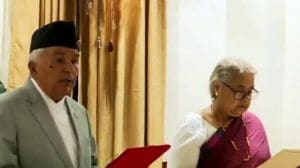Blast costs Iran contact with US
The Bush administration, alarmed by intelligence suggesting that Al Qaeda operatives in Iran had a role in the May 12 suicide bombings in Sa...

The Bush administration, alarmed by intelligence suggesting that Al Qaeda operatives in Iran had a role in the May 12 suicide bombings in Saudi Arabia, has cut off once-promising contacts with the country and appears ready to embrace an aggressive policy of trying to destabilise the government, administration officials said.
Senior Bush administration officials will meet on Tuesday at the White House to discuss the evolving strategy toward the Islamic republic, with Pentagon officials pressing hard for public and private actions that they believe could lead to the toppling of the government through a popular uprising, officials said.
The State Department, appears inclined to accept such a policy, especially if Iran does not take any visible steps to deal with the suspected Al Qaeda operatives before Tuesday, officials added.
But State Department officials are concerned that the level of popular discontent there is much lower than Pentagon officials believe, leading to the possibility that US efforts could ultimately discredit reformers in Iran.
Until the Saudi bombings, some officials said, Iran had been relatively cooperative on Al Qaeda. Since the September 11, 2001, attacks, Iran has turned over Al Qaeda officials to Saudi Arabia and Afghanistan. In talks, US officials had repeatedly warned that if any Al Qaeda operatives in Iran are implicated in attacks against Americans it would have serious consequences for relations between the two countries. Those talks, however, were held with representatives of Iran’s Foreign Ministry. Other parts of the Iranian government are controlled not by elected reformers but by conservative mullahs.
A senior administration official who is sceptical of the Pentagon’s arguments said most of the Al Qaeda members appear to be located in an isolated area of northeastern Iran, near the border with Afghanistan. He described the area as a drug-smuggling terrorist haven.
It is not clear how much control the central Iranian government has over this area, he said. ‘‘I don’t think the elected government knows much about it,’’ he said. ‘‘Why should you punish the rest of Iran,’’ he asked, just because the government cannot act in this area? (LATWP)
Photos





- 01
- 02
- 03
- 04
- 05


























